It’s been a busy month, hence the lack of updates, but here’s a brief wrap-up of some films I've caught over the past month. Just a quick note before I get started: It appears the Academy has reversed their decision, and now the score for The Dark Knight is eligible for Oscar consideration. It seems the minor outcry has woken up the Academy members – at least this time around.
Quantum Of Solace
Picking up right where Casino Royale ended, the next installment of the retooled James Bond series continues with the previous film’s dedication to realism and kinetic set pieces. Unfortunately, in picking up the same storyline, Quantum Of Solace never really feels like its own film. Where Casino Royale re-introduced Bond in a new setting, with a Bond girl of substance and a compelling story, Quantum Of Solace goes over the same thematic ground, and even with two new Bond girls, can’t seem to escape the shadow of the previous film. That said, it’s an enjoyable, and fast moving two hours with some fantastic action sequences.
Let The Right One In
Forget Twilight – the vampire film of the year is a little gem from Sweden called Let The Right One In. Directed with great restraint by Tomas Alfredson, the film concerns the relationship between a bullied boy and his neighbor who happens to be a vampire. And that’s about all I’m willing to say about the film. Let The Right One In is the rare horror film that offers depths far beyond its genre trappings and offers more to the viewer the less he or she knows about the film going in. It is a welcome reprieve from the torture pictures that mark American horror films these days, and proves that “mature horror film” isn’t a contradiction in terms.
Synecdoche, New York
Charlie Kaufman, best known for his narratively complex screenplays such as Being John Malkovich, Eternal Sunshine Of The Spotless Mind and Adaptation directs his first feature with Synecdoche, New York. Once again pondering his favorite thematic territory of identity, Kaufman’s film follows the life of playwright of Caden Cotard as he mounts his life’s work, a nameless play in endless rehearsal that ultimately consumes him. Philip Seymour Hoffman gives another great performance in the lead role, that takes his character from midlife to death, through various crises and romantic entanglements. While Kaufman’s script is fascinating in its execution, particularly in the latter part of the film as various realities fold in on each other, it never offers the emotional punch the material requires. And that prevents this otherwise very good film, from being truly great.
The Taking Of Pelham One Two Three
With a remake slated for release next summer, starring Denzel Washington, John Travolta and James Gandolfini, there is no better time than now to visit the original. Released in 1974 and starring Walter Matthau as the charmingly cranky Lt. Garber, The Taking Of Pelham One Two Three is a taut thriller, with a simple premise: four heavily armed men have hijacked a subway car, and unless they are paid $1 million in an hour, hostages will start dying. There are no romantic subplots here or political messages – just a simple race against time, with 1970s New York City in all its color – both literally and figuratively – providing the backdrop. It’s a classic, old school thriller as Matthau works desperately to save lives and figure out who the mastermind is behind the heist. A quick bit of trivia: Quentin Tarantino borrowed the color naming system the bad guys use in this film for his film Reservoir Dogs.
There has been some inquiries as to when my best films of the year will be announced. As many of the Oscar contenders are just hitting theaters now, I will be seeing as many as I can over the coming weeks in order to cover as much ground as possible before I name my favorites. I'm aiming to have my ten best list online in the week leading up to the Oscars in February.
Sunday, December 28, 2008
Thursday, November 27, 2008
Hearing Benjamin Button
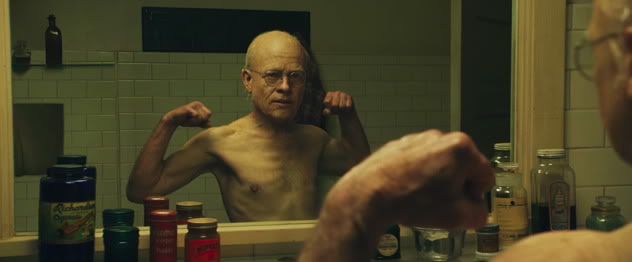
One the most anticipated films of the year, and one that I have been eagerly awaiting, is David Fincher's epic adaptation of F. Scott Fitzgerald's short story, The Curious Case Of Benjamin Button. The film chronicles the life and love of a man who, "born under unusual circumstances", ages backward. The film is already garnering Oscar buzz, and an early push is beginning for Alexandre Desplat's score. The French composer is one of the most innovative forces in Hollywood right now, and is best known by cinephiles for his stirring work on Jonathan Glazer's criminally underrated film, Birth. Warner Brothers, have launched their "For Your Consideration" site for British film critics that provides a quality stream of Desplat's score. In addition to the well received trailers for the film, it's yet another small, but exciting sampling from the film.
The Curious Case Of Benjamin Button opens on Chirstmas Day.
Labels:
Alexandre Desplat,
David Fincher,
Drama,
Warner Brothers
Monday, November 17, 2008
Silent Knight Update
The good people over at Cinematical have compiled their own list of outrageous Oscar disqualifications throughout the years. Check it out here.
Saturday, November 15, 2008
Silent Knight
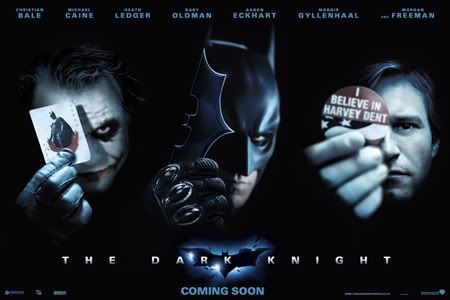
The Academy rules for Oscar consideration are usually more complicated than they need to be, and often end up shutting out valid nominees because of arbitrary rules. Last year, one of the more high profile rulings went against Radiohead guitarist Jonny Greenwood, for his score to Paul Thomas Anderson's highly acclaimed film There Will Be Blood. The Academy decided that Greenwood's score which ran a total of 35 minutes (and contained some of his 2006 composition "Popcorn Superhet Receiver") was not distinguishing enough from the other 45 minutes of pre-existing music that was also used for the score. At the end of the day, the startling effect of Greenwood's score on the film - that many reviews noted and, logically, should be the only factor in deciding if a film merits a shot at being given an Oscar nomination – was shrugged off for nonsensical technical reasoning.
And this year, more idiocy arrives from the Academy as the score for the biggest film of the year, The Dark Knight, has also become disqualified for consideration because too many people were given writing credits. That's right, too many people were involved for their liking. This is more inane reasoning from the Academy that completely ignores the fact that collaborative score by Hans Zimmer and James Newton Howard, is one of the better compositions this year. The paranoia inducing "A Little Push" was in itself another dimension to Heath Ledger's already icon-making performance as The Joker, and one of bravest pieces of music found in a mainstream film of any year.
As the Academy each year wonders why the audiences are dropping for the televised ceremony maybe they should consider stopping these petty, semantic politics and let the films speak for themselves. The audience wants to know that the films that are being nominated are there for the right reasons, not because they managed to navigate their way through the thicket of the ever-changing Academy rulebook and made nice with the right players in the upper reaches of the Academy's boardroom.
Tuesday, November 11, 2008
For Your Consideration: Bill Irwin

Before Rachel Getting Married arrived in theaters, it rode on a wave of buzz praising first time screenwriter Jenny Lumet's script and Anne Hathaway's turn as struggling drug addict, Kym. I caught the film over the weekend, and Lumet's writing and Hathaway's performance are definitely worthy of accolades, however, it's Bill Irwin's turn as Paul, the father caught in the middle of a family ripped apart by various tragedies, that really captured my attention.
Irwin has had a career that has varied from his Tony Award winning role as George in Who's Afraid Of Virginia Woolf on Broadway, to his induction into the International Clown Hall Of Fame for his extensive circus and comedy work. Oddly, it's his physical comedic skills that allow Irwin to give a richness to the character of Paul that is essential in communicating the pain that has gripped the family. While Paul is busy fussing over the family and the preparations for his daughter's wedding, the pain he feels is worn for the entire film on his fractured face, which looks like it will fall to pieces at any moment and in the nervous movements as he tries to ensure everyone has everything they need. Irwin has no big lines or big speeches, but ends up with one of the most devastating moments of the film, and where another actor would've played it large, Irwin slumps and retreats, defeated, without a word spoken.
While the Academy loves big meaty, scenery chewing parts, Irwin does something much more difficult. He envelops and finds the essence of a role that on paper doesn't offer much to work with. He gives Rachel Getting Married its wrecked, trembling heart and allows the audience to hope, along with Paul, that somehow it will be pieced back together.
For your consideration: Bill Irwin for Best Supporting Actor for Rachel Getting Married.
Labels:
Anne Hathaway,
Bill Irwin,
Drama,
Jenny Lumet
Thursday, November 6, 2008
Finding Che
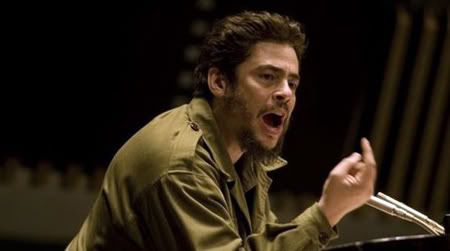
This summer, Steven Soderbergh’s epic Che, a biopic of the iconic revolutionary, arrived at the Cannes Film Festival. Presented as a single film with an intermission, and running a staggering four hours, it received mixed reviews from critics, but universal praise (and an award) for Benecio Del Toro’s performance in the title role. As summer began turning into fall, the film was still searching for a North American distributor. The high price tag ($8-10 million), the lengthy running time and the subtitle factor (as the film is largely in Spanish) seemed to keep buyers away, though the film quickly sold rights for other foreign territories. Finally, after screening at the Toronto Film Festival in September, IFC announced they had picked up North American distribution rights for the film.
Last week, they finally unveiled how they will be rolling out the film to theaters, and it couldn’t be any more complicated if they tried. Here’s a timeline:
December 12th – A one week only, Oscar qualifying run will start at the Zeigfield in NYC and the Landmark in LA. The film will be digitally projected, and shown as a single 4 hour film (with a 30 minute intermission). Everyone who attends screenings this week will also receive a program.
January 9th – The film returns to NYC and LA, but in two separate parts, Che (Part 1) and The Argentine (Part 2).
January 16th and 22nd – Both films expand into the “Top 25” markets
January 21st – The film debuts in standard and HD on IFC’s video-on-demand service (presumably in two parts)
Sometime in the future – An exclusive Blockbuster video release (details forthcoming)
I understand that a four-hour Spanish film about a political figure isn’t exactly an easy sell, but IFC needs to get out of this Blockbuster exclusivity nonsense quickly. It brings nothing to the table for them. IFC generally deals in indie or arthouse films, and that crowd largely wants nothing to do with Blockbuster, choosing better and more widely stocked specialty shops or going online with services like Zip (in Canada) or NetFlix to buy and rent movies.
Soderbergh’s Che is easily one of the most anticipated and ambitious cinematic events of the year. However, if you’re not in one of the top 25 markets (if anyone knows what they are, please tell me), near a Blockbuster or have access to IFC’s video on demand service (place a checkmark beside all three of those for me) finding Che is going to be quite difficult.
Labels:
Benicio Del Toro,
Biopic,
Blockbustert,
Che,
IFC,
Netflix,
Steven Soderbergh,
The Argentine,
Zip
Wednesday, November 5, 2008
A Dream Realized
Congratulations, Barack Obama. Congratulations, America. A monumental step forward from what was just a dream forty five years ago.
Tuesday, November 4, 2008
Taking It Back
While the world watches tonight, hoping and praying for Barack Obama to take the presidency, take ten minutes to watch Spike Lee's powerful short documentary, We Wuz Robbed about the Florida fiasco of 2000, to put into perspective how important and monumental this night will be.
We Wuz Robbed
We Wuz Robbed
Thursday, October 30, 2008
High And Low Redux
While it took Hollywood nearly forty years to finally honor the talents of Martin Scorsese, the Academy recognized his talents with a Best Director Oscar for The Departed. The film, an excellent remake of the contemporary Asian crime film Infernal Affairs, worked for a couple of reasons. Despite some faint, initial outcry, the original, while very good, wasn't great. While it had a very good premise (the cops and criminals each with a mole in the other's camp), it didn't elevate beyond standard procedural tropes. In the remake, screenwriter William Monahan found a psychological core that didn't exist with the original and raised the stakes, using the premise as a launch pad to investigate the relationship between class and power. And it certainly didn't hurt that Jack Nicholson, Leonardo DiCaprio, Mark Wahlberg and Alec Baldwin were delivering the lines.
Now comes an announcement that Scorsese plans to executive produce a remake of Akira Kurosawa's classic, High And Low. As much as I love and respect Scorsese, this just smells of another attempt at Oscar gold. Teaming with producer Scott Rudin (No Country For Old Men, There Will Be Blood), director Mike Nichols (The Graduate) and screenwriter David Mamet (Glengarry Glen Ross), and no doubt enlisting an A-list cast, the project seems to be surefire bet for Oscar consideration. But where Infernal Affairs benefited from a script rework, I just can't see how Mamet can improve on the original.
The film, based on pulp novelist Ed McBain's King's Ransom concerns the kidnapping of wealthy businessman's son. As he races to get money together for the ransom, it is revealed that the criminals made a mistake, and actually kidnapped his driver's son. In addition to adding another layer of white knuckle tension, the film doubles as exacting social commentary, and Kurosawa balances everything with the deft and assured hand of a master at work. In short, the original is already thematically rich in addition to being absolutely thrilling. A remake would be nothing short of redundant; the same film dressed up in modern clothing.
Remakes in and of themselves, aren't necessarily a bad thing, and have been a Hollywood tradition since the cameras were first turned on. That said, Hollywood does have a horrible habit of remaking anything and everything without much in the way of discretion. It will be interesting to see what the end result turns about to be, but I'm not holding my breath. In the meanwhile, if you haven't seen High And Low, there is no better time than now to see it. The Criterion Collection has just re-issued the film in a fantastic two-disc set.
Now comes an announcement that Scorsese plans to executive produce a remake of Akira Kurosawa's classic, High And Low. As much as I love and respect Scorsese, this just smells of another attempt at Oscar gold. Teaming with producer Scott Rudin (No Country For Old Men, There Will Be Blood), director Mike Nichols (The Graduate) and screenwriter David Mamet (Glengarry Glen Ross), and no doubt enlisting an A-list cast, the project seems to be surefire bet for Oscar consideration. But where Infernal Affairs benefited from a script rework, I just can't see how Mamet can improve on the original.
The film, based on pulp novelist Ed McBain's King's Ransom concerns the kidnapping of wealthy businessman's son. As he races to get money together for the ransom, it is revealed that the criminals made a mistake, and actually kidnapped his driver's son. In addition to adding another layer of white knuckle tension, the film doubles as exacting social commentary, and Kurosawa balances everything with the deft and assured hand of a master at work. In short, the original is already thematically rich in addition to being absolutely thrilling. A remake would be nothing short of redundant; the same film dressed up in modern clothing.
Remakes in and of themselves, aren't necessarily a bad thing, and have been a Hollywood tradition since the cameras were first turned on. That said, Hollywood does have a horrible habit of remaking anything and everything without much in the way of discretion. It will be interesting to see what the end result turns about to be, but I'm not holding my breath. In the meanwhile, if you haven't seen High And Low, there is no better time than now to see it. The Criterion Collection has just re-issued the film in a fantastic two-disc set.
Tuesday, October 28, 2008
Some Pleasant Diversions
I just wanted to take a moment to highlight some people and places that have been kind enough to drop by.
Liz Ohanesian is a freelance journalist based in Los Angeles who has written for the Santa Monica Mirror, PopMatters, Outburn and most recently wrote an excellent piece on director Charlie Kaufman and his new film Synecdoche, New York for LA Weekly. Her blog, Party Pauper, links to her work and also gives some great insight into the life of a freelance writer.
If you've checked out the comments on some of my posts, you'll find some very passionate opinions from Kim Dubuisson, the man behind Gorezone. It's a one stop shop for news and reviews from the world of horror films. He brings that same passion to his site and it's treat for genre enthusiasts.
Finally, even my Dad has gotten into the blogging phenomenon, with A Positive Focus, where he dispenses his thoughts on various topics, with a unique perspective.
Please take a few minutes and check 'em out.
Liz Ohanesian is a freelance journalist based in Los Angeles who has written for the Santa Monica Mirror, PopMatters, Outburn and most recently wrote an excellent piece on director Charlie Kaufman and his new film Synecdoche, New York for LA Weekly. Her blog, Party Pauper, links to her work and also gives some great insight into the life of a freelance writer.
If you've checked out the comments on some of my posts, you'll find some very passionate opinions from Kim Dubuisson, the man behind Gorezone. It's a one stop shop for news and reviews from the world of horror films. He brings that same passion to his site and it's treat for genre enthusiasts.
Finally, even my Dad has gotten into the blogging phenomenon, with A Positive Focus, where he dispenses his thoughts on various topics, with a unique perspective.
Please take a few minutes and check 'em out.
Sunday, October 26, 2008
Don't Worry, Be Poppy

Director Mike Leigh, best known for his emotionally wrought dramas such as Vera Drake and Secrets & Lies, takes a 180-degree turn with his latest film, Happy-Go-Lucky. An unabashed burst of sunshine, Leigh’s lead character is Poppy, a 30 year old grade school teacher with a nearly manic thirst for life. Always eager to put a smile on someone’s face or listen to a problem, Poppy floats through her days content with living the same way she did at twenty years old. Leigh finds all of this oh so charming, and hopes the audience takes Poppy’s approach to life to heart as well, finding something winning in her unrestrained good nature and take-it-as-it-comes-with-a-smile-on-your-face attitude.
Unfortunately for Leigh, Happy-Go-Lucky veers dangerously close to being a tourism trip to the lower classes to celebrate their exotic ways. Poppy and her flatmate seem to live a life that is an extended version of a slumber party, as they walk around in old PJs, hang out together in their bedrooms and order take out. Poppy is also, conveniently, a grade school teacher where her amped up happiness can only prove to be an asset. However, a major sequence in the film has Poppy, her younger sister and her roommate heading out to the suburbs to visit her older sister. Pregnant, married and living in a new house with a yard, Leigh scripts her as haughty and condescending of Poppy’s lifestyle. The notion Leigh puts forth is that it’s inconceivable of somebody in the suburbs being truly happy the way Poppy is. It’s simplistic at best and borderline offensive at worst, suggesting that even though Poppy is lower down the food the chain, her lack of responsibilities somehow grant her a magical potion for a stress-free lifestyle. Leigh doesn’t see that there is a middle ground. There are many single people and couples with “adolescent” impulses, that also manage to balance mortgages, children and savings.
In an interview with the Hour, a weekly Montreal newspaper, Leigh states that the film is about "...the way ordinary people without privileges just get on with things, or don't, as the case may be. It's an anti-miserablist film, we are destroying ourselves and each other and the planet, and there's much to be gloomy about, but there are people out there getting on with it." What Leigh seems to not understand is that "ordinary people" "get on with it" because they have to. Poppy's life as a single woman with no children and a steady job, simply isn't representative of "ordinary people" and it's a major flaw that prevents Happy-Go-Lucky from gaining any kind of insight into the true workings of the lower or middle class. If Leigh had chosen a single mother, or a family with both parents working and raising children, it would've been a truer representation of what so-called "ordinary people" do to "get on with it". But he plays it safe and familiar, giving the audience a digestible, quirky British girl to tell them to smile and be happy with their lot. Which, to put it in British terms, is a whole lot of rot.
Thursday, October 23, 2008
Woody's Barcelona
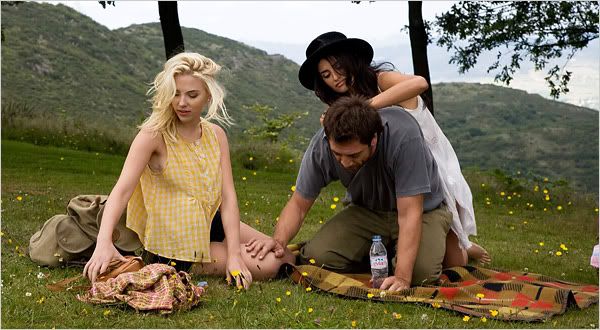
For the better part of three decades, Woody Allen has been New York City’s unofficial biographer, capturing with a lover’s eye, that magical city's elusive allure as he wound his characters through the streets that never sleep. Who can forget the brilliant series of black and white still shots that open Manhattan; the architecture tour in Hannah & Her Sisters or the numerous apartments, theaters and parks that tracked a relationship in Annie Hall. It seemed impossible to think of Woody Allen even considering shooting in another city. But while European audiences continued to support Allen, the quintessentially American filmmaker couldn’t seem to find an audience at home, and in 2005 Allen crossed the Atlantic where funding and support were more readily available.
Match Point, Allen’s triumphant return to critical acclaim, marked the first of three films shot in England. While both Match Point and Cassandra’s Dream were exercises in morality, and Scoop a nostalgic take on classic comedy tropes, Vicky Cristina Barcelona vaults itself over any genre specifications and into the canon of Allen’s finest accomplishments. Moreover, it finds Allen training his camera with the same lingering sense of longing and beauty that he would in New York City, on the landmarks of Barcelona and provincial Spain.
Needless to say, I’ve been looking forward to this film all year, but even I could not have anticipated what an accomplishment Vicky Cristina Barcelona is. On the surface, the traditional Allen themes of romanticism versus pragmatism, art versus commerce and the sources of artistic inspiration are all to be found here. But what unfolds is something richer that taps deep into the well of the sacrifices that are made for passion and comfort, wrapped in a remarkable package that is by turns hilarious and sober.
Best friends Vicky (Rebecca Hall) and Cristina (Scarlett Johannson) are on vacation in Barcelona. Vicky is due to marry her thoroughly bland fiancee Doug upon her return to New York City, while Cristina is simply drifting, caught in a state of post-graduation uncertainty. One night at dinner, they are very openly propositioned by Juan Antonio (Javier Bardem), an artist who suggests they all spend the weekend together in the country, take in the sights, have some good food and of course, sleep together. The buttoned down Vicky is appalled, while Cristina is intrigued. They end up deciding to go with Juan Antonio, but with no guarantee of sex. Of course, both girls end up falling for Juan Antonio and from there, without spoiling the film for anyone, the wheels are put in motion for a very interesting summer.
Allen seems to have relished his time in Bareclona and Spain, as he scatters the film with shots of Gaudi’s famous buildings, the colorful alleyways of metropolitan Barcelona, and with a honey glazed lens, finds the soul of rural Spain, with simple shots of storefronts and quiet landmarks that left my fellow audience members literally gasping. But beneath these shots, and just visible under the dual love triangles that make up the film, is a very sophisticated script that offers up a progressive view of artistic relationships (both romantic and professional), that considers what each person brings into a situation, and makes quiet argument that sometimes multiple partners are needed to maintain the balance of sexual, artistic and emotional needs. It’s an intriguing logic, and certainly very “European”, but it’s all the more remarkable in that it’s coming from a man who is at an age when most directors and writers have long retired. It’s inspiring to find a director who is still working out new angles on familiar themes, with the intelligence many in the industry half his age simply lack.
Vicky Cristina Barcelona was more than worth the wait, and it ranks with Allen’s finest films. Funny and heartwarming, it’s a wonderful journey that doesn’t offer simple solutions for the lives of artists, but humbly suggests, without judgment, that the paths chosen are the ones best for the individual (or individuals) involved.
Labels:
Comedy,
Drama,
Javier Bardem,
Penelope Cruz,
Romance,
Scarlett Johansson,
Woody Allen
Friday, October 17, 2008
Clint Eastwood 1, Spike Lee 0
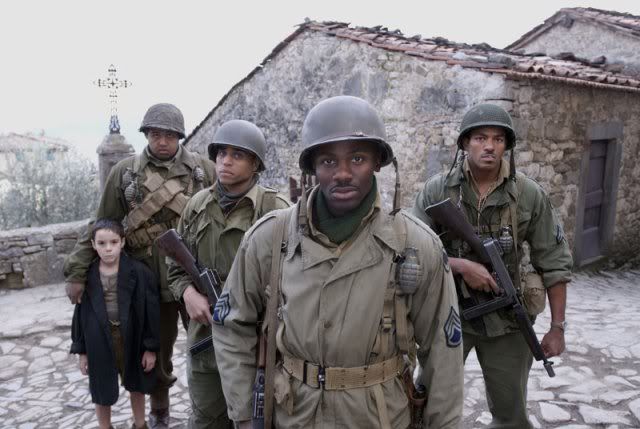
This summer, Spike Lee and Clint Eastwood got into a very public war of words, when Lee attacked Eastwood for not giving enough representation to African-American soldiers in his duo of WWII films, Flags Of Our Fathers and Letters From Iwo Jima. Lee made the comments at the Cannes film festival, where he just happened to be showcasing an eight minute reel of his own WWII epic, Miracle At St. Anna. While I understood Lee's point, his actions played out as nothing more than some bait to throw journalists to give free promotion to his upcoming film. As for Eastwood, his reaction was just as juvenile, and I frankly thought his WWII films were a pedestrian endeavor at best. All that said, I hoped that Lee would back up his vitriol with a film that would finally bring a real African-American perspective to WWII.
He didn't.
Miracle At St. Anna is a qualified trainwreck that conversely has too much and too little within its overly long two hour and forty minute running time. What is in excess is plot, with James McBride's script (adapted from his own novel) overflowing with multiple, meandering plot lines that often stall and stutter, instead of advancing the story. Thus, its all the more vexing that every character in the film - the quartet of black soldiers; German soliders; Italian citizens and even Americans back home - never develop beyond one dimensional characters. It's hard to believe that the same man who made the wonderfully furious and complex Do The Right Thing is responsible for the run of baby killing Germans, gesticulating Italians, backward hillbillies and ignorant American Army brass that populate the film. McBride and Lee even have the audacity of tossing in a "magical negro", an archetype which Lee himself so famously derided, into one of the lead roles.
As I waited with growing impatience for the film to end, wondering why John Leguizamo, John Turturro and Joseph Gordon-Levitt all signed up for roles that were essentially nothing more than (wasted) cameos, it was Derek Luke's magnetic performance that kept me invested in the film. And the photo still above starts one of the most powerful shots/sequences in the film, that ranks right up there with Lee's most memorable scenes, and it still gave me hope that Lee had something up his sleeve for the ending.
But it wasn't to be.
McBride's script closes the film with a conclusion so pat and sweet, you may need to see the dentist, and then as if to up the unbelievability factor, Lee treats the audience to "He's Got The Whole World In His Hands" over the end credits. Lee's film is so bad that comparing it Eastwood's film - or any other WWII film for that matter - is just embarrassing.
Spike Lee hasn't lost his passion, but with Miracle At St. Anna, he lost his focus. With the film unfolding in a few different directions - WWII epic, revenge film and fantasy film - it never gels into a cohesive whole. His indictment of the treatment of African-American soldiers simply gets lost in the mechanics of a preposterous, overly complicated story. I'm still rooting for Spike Lee but he needs to get back to the kind of lean, effective filmmaking that made Do The Right Thing, Clockers, Get On The Bus, 25th Hour and Inside Man so invigorating and powerful.
Tuesday, September 30, 2008
When Film Critics Don't Help Themselves
Film criticism has taken a severe beating over the past couple of years. With physical newspapers losing readership and relevance to the variety of up to date coverage available on the internet, media owners have begun trimming the fat and film critics have faced a purge as their perceived value has been diminished. Many pieces and arguments have been written about the state of film criticism, and why critics are vital to the development of cinema. While I won't rehash the argument here, needless to say, I too believe film criticism is necessary.
However, earlier this week I came across a piece by Boston Globe "film critic" Wesley Morris that frankly, blew my mind. It reminded me why film critics continue to be received as nothing more than nerds with an opinion, and furthermore, why anyone from casual bloggers (myself included) to "entertainment reporters" are given just as much credibility as scholars. Entitled "An Offer I Could Refuse", Wesley Morris uses the recent and celebrated BluRay release of The Godfather films to confess that he had not seen them. Using every excuse in the book from "I was born after it was made" to "I just missed them", Morris makes no bones about being a professional, paid film critic who just happened to be ignorant of the one of the most important, influential films of the past thirty-odd years. In short, The Godfather changed every film and story about the mafia that came after it, and to say that one "gets it" by the countless pop culture references it has produced (as Morris lamely does) is to miss the point completely. And as if to put the final nail in his coffin, Morris' final summation of the importance of the films is so completely superficial as to be meaningless. "Power corrupts" is just one of the many layers in Coppola's fable that moves beyond its gangland trappings to cover the American dream and the immigrant experience.
If I can dash this off in the few moments I have before leaving for the office this morning, surely if completely focused, I can do Mr. Morris' job with as much insight and perhaps even more (and I've already seen The Godfather trilogy). So to the editors of the Boston Globe and Wesley Morris I offer this challenge: let us write some head to head reviews of current films or new DVD releases and see if your readers can tell the difference. I'm certainly not a Yale graduate, but just by being a cinema lover in general, I bet I can bring the same degree of professionalism and depth to my pieces as Mr. Morris. If Mr. Morris and the Boston Globe are truly interested I'll be more than happy to pass along sample reviews of music and film from my stint with PopMatters.
I certainly hope Wesley Morris doesn't represent the new face of the film criticism, because if so, he may want to start updating his CV.
However, earlier this week I came across a piece by Boston Globe "film critic" Wesley Morris that frankly, blew my mind. It reminded me why film critics continue to be received as nothing more than nerds with an opinion, and furthermore, why anyone from casual bloggers (myself included) to "entertainment reporters" are given just as much credibility as scholars. Entitled "An Offer I Could Refuse", Wesley Morris uses the recent and celebrated BluRay release of The Godfather films to confess that he had not seen them. Using every excuse in the book from "I was born after it was made" to "I just missed them", Morris makes no bones about being a professional, paid film critic who just happened to be ignorant of the one of the most important, influential films of the past thirty-odd years. In short, The Godfather changed every film and story about the mafia that came after it, and to say that one "gets it" by the countless pop culture references it has produced (as Morris lamely does) is to miss the point completely. And as if to put the final nail in his coffin, Morris' final summation of the importance of the films is so completely superficial as to be meaningless. "Power corrupts" is just one of the many layers in Coppola's fable that moves beyond its gangland trappings to cover the American dream and the immigrant experience.
If I can dash this off in the few moments I have before leaving for the office this morning, surely if completely focused, I can do Mr. Morris' job with as much insight and perhaps even more (and I've already seen The Godfather trilogy). So to the editors of the Boston Globe and Wesley Morris I offer this challenge: let us write some head to head reviews of current films or new DVD releases and see if your readers can tell the difference. I'm certainly not a Yale graduate, but just by being a cinema lover in general, I bet I can bring the same degree of professionalism and depth to my pieces as Mr. Morris. If Mr. Morris and the Boston Globe are truly interested I'll be more than happy to pass along sample reviews of music and film from my stint with PopMatters.
I certainly hope Wesley Morris doesn't represent the new face of the film criticism, because if so, he may want to start updating his CV.
Tuesday, September 16, 2008
Vicky Cristina Montreal!
Well, it appears my little rant was for nought, as the film is finally opening in Montreal on September 19th. I'm not really sure what the reason was for the delay, as Allen's other films have generally arrived on time, but I'm glad I'll have the chance to catch it on the big screen.
Thursday, September 11, 2008
Sam Raimi: From Daring To Dull
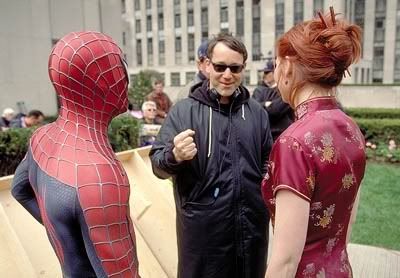
It’s odd to watch a once daring cult director settle so comfortably into mainstream mediocrity, but that’s just what has happened with Sam Raimi. During the ‘80s and ‘90s, Raimi made his name with his over-the-top meta-horror trilogy of Evil Dead films, while continuing with off-the-beaten path projects like Darkman and The Quick And The Dead. By the late ‘90s he even started to mine more serious territory, like his pals the Coen Brothers, with the excellent A Simple Plan. Raimi then stumbled a bit, starting with the Kevin Costner weepy baseball film For Love Of The Game followed by The Gift, which is most renown for giving the world a glimpse of Mrs. Tom Cruise’s breasts.
And then came Spiderman.
The teaming of Raimi and Spiderman was initially a fanboy’s dream, and the first film was a faithful adaptation, keeping the comic’s humor, tone and playfulness intact. However, as the franchise continued, it spawned two more, lesser sequels, in which the writers seemed more concerned about wooing tweenage audiences, than writing a credible story. Spiderman essentially became, a mopey teenager who spent more time pining for girls than flying around the city kicking ass. As for Raimi, his once unique stamp had all but disappeared in these films (aside from the obligatory cameos from his longtime friend Bruce Campbell) in a haze of poorly rendered CGI. However, the films were massively successful, but instead of leveraging that success into personal projects, Raimi instead fell into producing a spate of low-grade, PG-13 “horror films” or defanged J-horror remakes such as The Grudge, The Messengers and Boogeyman. Unlike Christopher Nolan who flexed his directorial muscles with The Prestige between his highly acclaimed Batman films, Raimi simply did nothing.
And now, Raimi has signed on to direct two more Spiderman sequels.
What has happened to Sam Raimi? While fans may point out he does have his first non-Spiderman film in nearly ten years, Drag Me To Hell, is coming out in 2009, it should be noted that Ghost House Pictures, his partner in the slurry of cheapie horror flicks noted above, is producing the film so it doesn’t make me optimistic about its prospects. In my mind, Raimi has effectively turned into George Lucas, reaping the benefits of a successful franchise, while no longer being interested in challenging himself as a director. The fire that once sparked one of the most inventive minds in the business has all but been snuffed out.
The only positive thing out of all of this is that it will hopefully put Raimi’s gestating, but ill-advised, remake of his own Evil Dead film on the backburner. But the director who once worked so passionately on the fringes, is now disappointingly complacent within the Hollywood machine.
Monday, September 1, 2008
See "No End In Sight" For Free
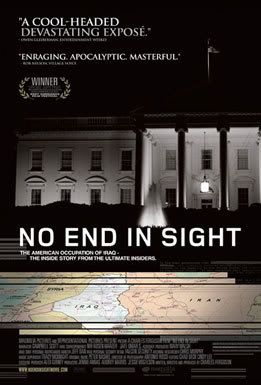
No End In Sight, the Academy Award nominated film for Best Documentary Feature, has now been made available for free viewing, in its entirety and adfree, on YouTube, through election day, November 4th, 2008. This is a film that can't be reviewed, so much as discussed; that can't be watched, so much as felt. Director, writer and producer, Charles Ferguson, interviews key players within the various governmental departments responsible for the war and documents the decisions and policies that led to the breakdown and insurgency within Iraq. It's an extraordinarily powerful work, that is a sobering and devastating critique of the Bush administration and a superb analysis of a war gone wrong. It's a film that is frequently frustrating in showing the level of arrogance, hypocrisy and plain stubbornness of officials as they time and again ignore official military intelligence or plain common sense in every step of this ill-timed and illegitimate war.
However, what also comes through is the extraordinary bravery of the everyday soldiers on the ground. While we've heard countless politicians give the same tired rhetoric praising their work, it's not until you hear it first hand that it really strikes you how difficult their task is, and how deeply felt their conviction is to do right by the Iraqi people. Seth Moulton, David Yancey and Hugo Gonzalez are eloquent in describing the struggles they faced in Iraq, and in their unwavering desire to see finished the work that so many of their colleagues died working to achieve.
While critically lauded, the film only received a limited theatrical run and is currently available on DVD. Thanks to the generosity of Charles Ferguson and Magnolia Pictures you don't even need to leave the comfort of your own home to see the film.
Watch it here, in a high definition stream and pass on the link on to anybody who cares where the United States is headed for the next four years, especially during one of the most important elections of the last decade.
Wednesday, August 27, 2008
Kassovitz vs. Fox
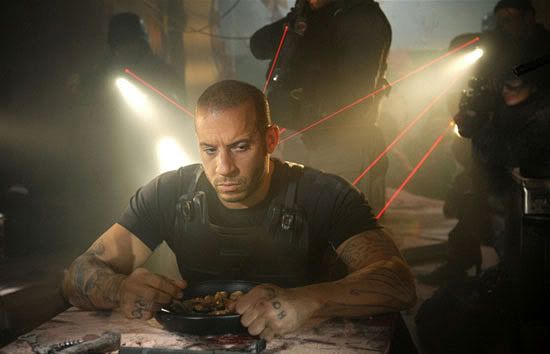
When actor and sometimes director Matthieu Kassovitz started shooting his long gestating sci-fi project, Babylon A.D., early set reports were not good, and seemed to hint at friction between the director and star Vin Diesel. Now with the film set to open in a few days, Kassovitz has gone public with his frustrations, and it isn't Diesel in the crosshairs, it's 20th Century Fox. According to Kassovitz, they meddled with the film every step of the way resulting in a final product that is nowhere near what he intended.
Some people, while somewhat sympathetic, think that Kassovitz is effectively killing his career in Hollywood by lambasting a major studio, and that he would be best advised to stay quiet, but I disagree. Kassovitz was never really a big commodity in Hollywood, and he will continue to get gigs and opportunities in Europe. However, the bigger issue here, and what is never mentioned when these types of situations arise, are the countless projects that are greenlit everyday by studios who have no real grasp of what they're signing onto on the dotted line. The Assassination Of Jesse James By The Coward Robert Ford, Across The Universe, The Invasion and I Am Legend are just a few recent films that went through very public troubles with their respective studios regarding their content, and of course there is the forthcoming Where The Wild Things Are, whose release date has been postponed indefinitely as rumors persist of the studio's unhappiness with overall tone of the film. Too often, stars or directors stay silent about projects they're unhappy with, in order not to upset the wrong people and to stay viable in the constantly shifting popularity contest in Hollywood. But studios have to start acknowledging their role in this too, and that a big part of this problem comes from signing first and asking questions later, resulting in projects that are losses for both the talent and money involved.
So bravo to Kassovitz for taking a stand!
Labels:
20th Century Fox,
Babylon A.D.,
Matthieu Kassovitz,
Vin Diesel
Thursday, August 21, 2008
Vicky Cristina Montreal?

It seems for the second time this year, Montreal cinemas have been robbed of Woody Allen’s latest film. This spring, I waited anxiously for Cassandra’s Dream to appear on cinema screens in the city. I go to the theater once a week and on three separate occasions I had seen the trailer for the film, with the logo for Montreal based distributor Metropole Films preceding the ad. Unfortunately, the film never materialized. Now, with glowing reviews, a stellar cast including Javier Bardem, Penelope Cruz and Scarlett Johansson, and one of the widest opening screen counts in his career, Woody Allen is again getting the cold shoulder from Montreal cinemas. Being in Quebec, Montreal film openings occasionally fall a week behind North American opening dates as the province’s byzantine and bizarre language regulations (generally) dictate that a dubbed or subtitled version of English films must also be available concurrently. But now, the second week after its opened, Vicky Cristina Barcelona is still nowhere to be seen in the province. This situation is even more bizarre as Woody Allen & His New Orleans Jazz Band were one of the featured artists of the Festival International De Jazz De Montreal this summer, playing two high-profile, sold-out (and expensive) shows.
To be fair, Woody Allen’s two previous films, the critically acclaimed Match Point and the underrated Scoop, had dismal runs in the city, barely lasting three weeks before being pulled. Adding to the confusion is that some smaller or independent films will often have separate Quebec based distributors handle the film, rather than the studio handling the rest of the North American rollout. But as the jazz festival has amply indicated, there is still a strong interest in the man and his films, and there should be no reason why Vicky Cristina Barcelona is not being put on at least one screen in this city.
The Weinstein Company who is handling the film’s distribution, in the face of weathering bad press and less than stellar box office returns from its recent slate of films, is perhaps playing it safe by landing this film in markets where it is sure to do well. But surely a Quebec distributor can step up and acquire the rights for this province? Is Woody Allen’s clarinet playing really more popular than his films in Montreal?
Wednesday, August 20, 2008
Reboot
Lately, some people have been asking what happened to the blog. Well, the good news is that it's coming back in a bit of a different format. When I initially started the blog, I essentially wanted an outlet for my thoughts on the films I watch. Given that I watch, on average, about three movies a week, it took considerable time to write, edit and post with the depth I wanted on every film I saw and I soon fell behind. As I kept trying to catch up and I fell behind even more to a point where I had to rethink what this blog is and will become. So, I'm going to be tweaking things slightly.
Firstly, the blog won't just be film reviews but also my thoughts on news, trends or just general observations on what's going on in the world of film. I will still include reviews on select films when I feel I have something of substance to say. But be assured the blog won't become simply an aggregator of movie links and I will steer clear of pithy or empty posts. My goal is to still have a blog where film is discussed intelligently, but that will allow me the flexibility to post about whatever subject I want without my self-imposed contraints on length.
I'm looking to have my first post in a long time up this weekend, working into a regular posting schedule by the end of the month. The layout for now will stay the same, but I may overhaul it when I have some time down the line.
Thanks for the interest and happy (future) reading.
Firstly, the blog won't just be film reviews but also my thoughts on news, trends or just general observations on what's going on in the world of film. I will still include reviews on select films when I feel I have something of substance to say. But be assured the blog won't become simply an aggregator of movie links and I will steer clear of pithy or empty posts. My goal is to still have a blog where film is discussed intelligently, but that will allow me the flexibility to post about whatever subject I want without my self-imposed contraints on length.
I'm looking to have my first post in a long time up this weekend, working into a regular posting schedule by the end of the month. The layout for now will stay the same, but I may overhaul it when I have some time down the line.
Thanks for the interest and happy (future) reading.
Saturday, March 8, 2008
Le Scaphandre et le papillon/The Diving Bell And The Butterfly (Julian Schnabel, 2007)
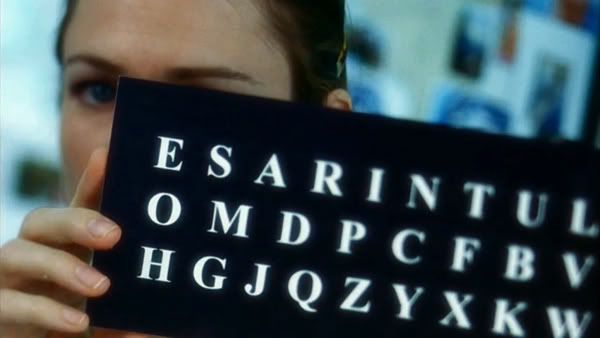
Fashionable, wealthy and influential, Elle editor Jean-Dominique Bauby seemingly had it all. Yet, when he suffered a stroke driving in his convertible in the middle of the French countryside, leaving his beautiful country home, one wonders if the damage he eventually suffered could have been averted if he had been closer to immediate medical assistance. We meet Bauby when he first wakes up in the hospital, where he discovers he has been in a coma. The doctors' standard questions soon turn to concern as the extent of the damage Bauby has suffered becomes apparent. He is diagnosed with Locked In Syndrome – a rare condition in which the brain retains all cognitive function but is unable to communicate with the rest of the body – and the once worldly Bauby is now confined to a wheelchair, unable to even speak.
The masterstroke of Julian Schnabel’s film, is that it refuses to stay confined by Bauby’s physical condition. Based on the titular memoir by Bauby - composed entirely by communicating to his speech therapist by blinking his left eye to identify letters as she reads them down from a chart in order of popular usage - Schnabel’s film pushes its setting far beyond the hospital doors, capturing the endlessly fertile thoughts spinning in Bauby’s head. While the film does focus on Bauby’s health and his care, celebrating his struggle and accomplishment in penning the novel, it never flinches from presenting his troubling relationships with the women in his life or the seemingly vacuous nature of this job at the magazine. Both before and after the accident, Bauby is presented as smart, sarcastic, funny, a jerk and a warm-hearted friend. We see him for everything he is from a dedicated son in the moving and heart wrenching scenes with his father (played magnificently by Max Von Sydow), to a callous, selfish man as he continues to juggle relationships between his lover and his wife, even from his hospital bed.
Largely filmed from Bauby’s point-of-view perspective, it’s no surprise that Julian Schabel comes from an art background. He finds compelling and beautiful ways to both capture to the terror of Bauby's condition and the beauty of his imagination. Using his painter’s eye, and working alongside noted cinematographer Janusz Kaminski, The Diving Bell & The Butterfly is a film that – like its subject – uses its limited resources to maximum effect. It refuses to be bound by conventions, and leaps boldly and beautifully to piece together the memories of a decadent life that finds its meaning in the gravest of tragedies.
Tuesday, March 4, 2008
À bout de souffle/Breathless (Jean-Luc Godard, 1960)
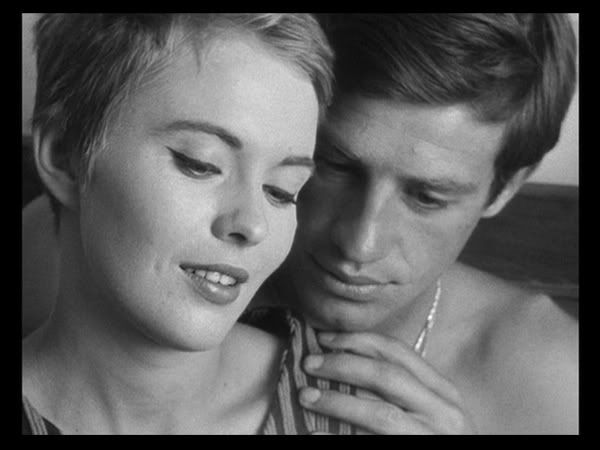
When Jean-Paul Belmondo’s fedora wearing, cigarette chewing Michel Poiccard declares at the beginning of the film that he is an “asshole”, he’s not kidding. A womanizing, self-absorbed, wannabe criminal, he spends his days making schemes and his nights chasing skirts. He idolizes Humphrey Bogart but carries none of his charm or gentlemanly manners. Poiccard's foil is the shatteringly gorgeous Patricia Franchini (Jean Seberg), an American student in Paris, and the only woman who resists his carefully constructed persona.
What continues to make Jean-Luc Godard’s debut film so fresh and exciting nearly fifty years since its release, is its unguarded ambition. The thin plot, in which Poiccard murders a policeman and goes on the run, is merely a foundation for screenwriter François Truffaut to use his characters as a platform to expound a world of ideas on France, politics, love, sex, women and philosophy. In fact, the film’s central sequence – and also its longest - does absolutely nothing to move the plot forward. It is simply Poiccard and Franchini in her apartment talking, arguing, insulting each other, espousing opinions, smoking cigarettes, and making love.
If Poiccard is a mess of bravely stated contradictions, Franchini’s purposely elusive sexuality is almost sinister. Franchini openly courts other men, coyly dismisses Poiccard’s advances yet ends up running into his arms. She follows him as he evades a police manhunt, yet her true intentions remain secretive until the final frames. For both Poiccard and viewer alike, it’s difficult to parse what Franchini’s true intentions really are. Does she really love Poiccard or is she just curious about what it's like being with a bad boy? Does she want to be a journalist or does she simply enjoy being the focus of powerful men’s eyes? Ultimately, the two are perfect for each other, as both are so caught up in their carefully arranged personalities, they lose track of who they actually are.
However, to write off Poiccard and Franchini as simply immature would be to miss the point entirely. Breathless resonates because it captures the exuberant energy of being young and in love, and embracing hardline convictions about anything and everything even when it’s coupled with a certainty in nothing. With a playful, casual spirit Godard both celebrates and repudiates the impulsiveness and naivete of youth in equal measure, but is always in full admiration of its unquenchable energy.
Labels:
Jean Seberg,
Jean-Luc Godard,
Jean-Paul Belmondo,
New Wave
Tuesday, February 26, 2008
Fong juk/Exiled (Johnnie To, 2006)
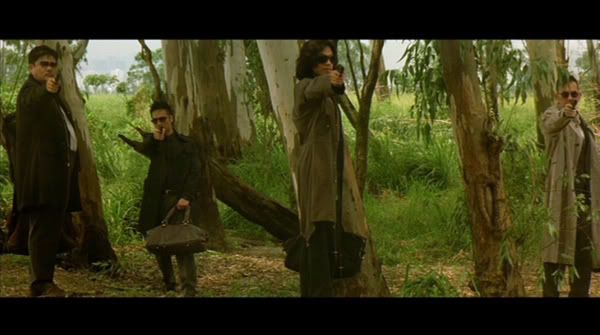
Johnnie To’s highly mannered, yet sufficiently bullet riddled gangster film tests two of the genre’s most important moral qualities: the importance of friendship vs. the bonds of loyalty. When an ex-member, banished from his home town for attempting to murder his mob boss decides to return home to raise his son, two of his best friends and former colleagues are sent to kill him, while two other friends vow to protect him. It’s a simple, ingenious concept that finds its characters – in between superbly choreographed gunfights – weighing their debts to gang fidelity.
There is a remarkable sequence early in the film in which the protectors and the assassins share cigars together in an unspoken professional understanding, while they await their mark to arrive. Once he does, they allow him to go up to his apartment and each side then sends one of their own upstairs after him. Just before they get down to business, they quietly ensure each man has the same amount of bullets. A violent three-way battle unfolds between the three men, leaving the apartment in near shambles, but when they all run out of ammunition, they simply stop, call in their associates, help the target move into the apartment and have dinner together. Eventually, the assassins and protectors agree that they can’t go through with killing each other or their mark, and vow to work together on some contract killings to get their friend out of town, with enough finances to raise his family.
From here, To sets up a familiar supporting framework. There’s a hooker looking to grab one big score, a cop on the verge of retirement and an absolutely psycho mob boss with a thirst for blood and money. Nevertheless, To’s mastery of the material keeps it from getting stale. It is a pure joy, coupled with some genuine surprises, watching the machinations of the plot click into place like a fine Swiss watch. As the film builds towards its monumental finale, To patiently and thoroughly weaves each strand of the plot into a perfect knot.
It’s rare to watch a film of this nature that treats the entire subject with near existentialism. Tonally, the film evokes the classic French gangster films of Jules Dassin or Jean-Pierre Melville. Behind the camera, To eschews realism for something more painterly. The film contains about four major action sequences, and each one is as carefully realized as the next, with the kind of balletic, yet over-the-top gunplay that John Woo excelled at in his pre-Hollywood days. Even the special effects defy reality as blood explodes in perfume-like puffs of mist rather than thick red streams. For the final sequence, To constructs a hotel set that cuts away the ceilings so he can shoot directly over the action, literally displaying the architecture of his shots.
Whereas American action films continue to aspire to bigger explosions and endless ammunition, To’s film is a exciting breath of fresh air. It makes every bullet, every movement and every word count, making it that much more exciting when the triggers are finally pulled and bodies are hurled almost angelically through the air.
Saturday, February 16, 2008
I Am Legend (Francis Lawrence, 2007)
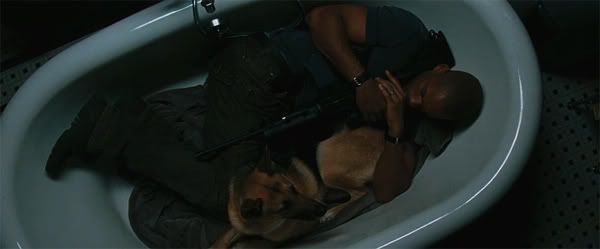
In a premise that seems to be en vogue of late, I Am Legend is a familiar tale of a country that has become victim to an unnamed, unknown plague which if it doesn't kill you, turns you into a monster, in this case, a variation of a vampire. Imagine the tweaked zombies of 28 Days Later with an allergy to the sun and you'll have the right idea.
While I definitely credit my friend Heidi for warning me in advance that the film was terrible, I was still allured by the film's slick trailer and The Dark Knight preview that would be in front of the IMAX showing of the film. The last film I saw in IMAX was a clearly wrongly projected Starsky & Hutch, so I had forgotten how good films can look on a three story screen. So if anything, I Am Legend looked great. And while I won't quite agree with Heidi that I Am Legend is terrible, it is certainly disappointing.
The biggest problem with I Am Legend is ultimately how empty the film is. This is a film that really didn't need to be more than 90 minutes and even then, it could be shorter. While Will Smith surprises at maintaining a strong screen presence for most of the film, there isn't just enough story here to make it work. The film waits a long time to get to it's third act, and when it does it is hugely unsatisfying. The film also suffers from a variety of plotholes, the most egregious being the shifting intelligence of the monsters. While they are savvy enough to set traps out to capture any humans, it seems they are mentally deficient in getting organized, or fighting in a coherent manner. Director Francis Lawrence does little more than send wave after wave of generic, CGI monsters in the film's final showdown. The monsters even sound generic. While casting avant garde music freak Mike Patton to enact the creature's voices was a masterstroke, the usually creative Patton seems to be held at bay here. The monster's voices are no different than the general squeals and roars you might expect. Patton is an extremely gifted individual behind the microphone and it's a shame his talents weren't put to better use.
The only true surprise of the film, is its relentlessly dark tone. Smith's character isn't particularly likeable, and for a Christmas season blockbuster the film stays grim right up until the end. But for a film that is brave in tone, it fails to take any daring steps narratively, and like much of the New York in the movie, it's completely barren.
Labels:
Francis Lawrence,
Horror,
Thriller,
Will Smith
Wednesday, February 13, 2008
The Lookout (Scott Frank, 2007)
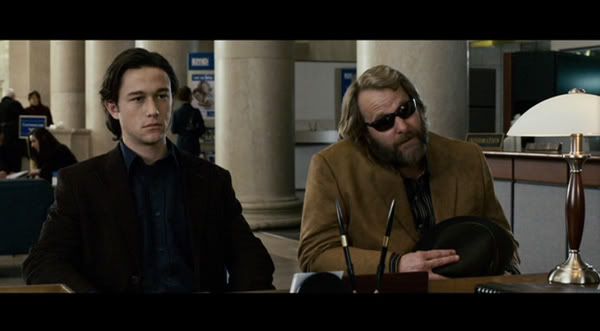
We all have a daily routine, but what if each day you had to be reminded what those series of small events were - taking a shower, brushing your teeth, going to work - and even what order they had to be done in? For former high school hero and aspiring athlete Chris Pratt (Joseph Gordon-Levitt) this is an everyday nightmare. After a horrific car accident that leaves two friends dead and estranges his former girlfriend, Pratt finds himself living in a cheap apartment with a blind man (Jeff Daniels) and a countless number of labels reminding Pratt of everything from what each kitchen cabinet contains to what nozzle in the bathtub is for the hot water. Attending life skills classes by day, cleaning a bank at night and now an icon of disappointment to his wealthy family Pratt's life in the middle of Kansas is going nowhere fast. One evening, a chance encounter in a bar introduces Pratt to three people who offer him friendship, sex and an opportunity to make something out of his frustrating existence. All they want him to do is to act as a lookout for a heist at the very bank he's working at.
The film's premise, at least on paper, comes dangerously close to being a gimmick: Brain damaged man is engaged into a bank heist. But longtime screenwriter Scott Frank, in his directorial debut, first creates an emotionally rich world in act one before kicking in the heist in the latter half of the film. We watch as Pratt desperately tries to apply for a promotion at the bank or even get the cadence of pickup line (that he wrote down in his always present notebook) right. His life is carefully ordered which helps keep his sanity intact, but when that order is challenged not only is the tension felt but the emotional fallout is equally devastating. But the film wouldn't succeed if the supporting characters weren't as well sketched out as they are here. Pratt's roommate Lewis is the film's humor and logic. He speaks the audiences fears and keeps Pratt's anger in check, and is a reminder to him that while things are tough, they could be worse. The other friend is Deputy Ted, played with a charming earnestness by Sergio Di Zio. Though he is onscreen for no more than ten minutes he plays a pivotal role in how the heist unfolds and as the audience grows attached to him, the grip around our hearts is tightened when this small town cop is suddenly involved in a big city crime.
Scott Frank already has a tremendous reputation with Get Shorty, Out Of Sight and Minority Report to his name. With The Lookout he settles comfortably into the director's chair. Much like fellow colleague Tony Gilroy, who also asserted his directorial prowess for this first time last year with Michael Clayton, Frank also shows flair with a tightly focused script, solid writing and sharp editing choices. The Lookout is another notch in Frank's belt, and one of the finest, shrewdest heist films in years.
Labels:
Jeff Daniels,
Joseph Gordon-Levitt,
Scott Frank,
Thriller
Monday, February 11, 2008
The Golden Compass (Chris Weitz, 2007)
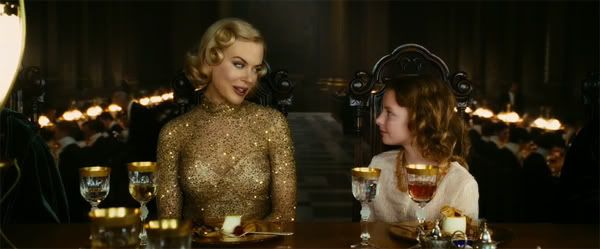
After the monumental financial and critical success of the Lord Of The Rings trilogy New Line studios were eager to launch another franchise that would reap the same rewards. The recipe for the Lord Of The Rings was certainly simple: a built in fanbase; a director with a reverential and dedicated love of the source material; and a savvy plan to shoot the entire trilogy simultaneously with a relatively modest (given the scope of the project) $300 million budget.
Perhaps still reeling in the excessive spoils of the Lord Of The Rings, New Line ignored virtually every rule that made that trilogy a worldwide phenomenon. The one thing they got right was in acquiring the rights to Philip Pullman's "His Dark Materials" trilogy, a cult favorite. However, in every other aspect of the production they got it wrong. Prior to this film, director Chris Weitz - who even left the project during pre-production stages - was previously known for directing American Pie, the tepid Chris Rock fantasy Down To The Earth and the sort of well received Hugh Grant film, About A Boy. Where Peter Jackson cut his teeth on fantasy films, Weitz is a rookie to the genre. Next, the first film alone cost an astronomical $200 million dollars. Finally, where the Lord Of The Rings tried to stay as close to the source as possible, leaving as little out as they could, prior to the release of The Golden Compass fans were already openly appalled at their perceived watering down of the thematic elements of the novel and the removal of several key sequences.
Going into the film, I had not read the books, but as soon as the cinema darkened I could already tell I was being given the Cliff Notes version. The film begins with a lengthy voiceover to explain the various terminologies and aspects of the plot we're about to be thrown into. Instead of a fascinating and organic learning process, the audience is given just enough to understand what is going on. Clearly trying to cram as much of the book as possible into two hours, Weitz simply moves the film along from plot point to plot point. The characters themselves are mere sketches and are simply divided into good guys and bad guys. I won't bore you with recounting everything here, but simply put there is a young girl who holds the fate of the entire world in her hands as she battles fascistic government forces and begins a quest that will dismantle their plans for complete control over the population. Her secret weapon? The titular, shiny navigation device. Her allies? A cowboy with a Texan drawl, a badass armored polar bear, a band of gypsies and a bevy of beautiful witches.
I'm giving the film more difficulty than I ought because, it is a generally entertaining movie. But there is a problem when one of the most fascinating characters in the film is a CGI polar bear. That said, the cast here is uniformly excellent. Newcomer Dakota Blue Richards holds her own against a roster of seasoned actors, while the constantly underrated Nicole Kidman not only looks gorgeous in about a half dozen fantastic outfits but is particularly devilish as the film's quasi femme fatale. The last forty five minutes of the film contain some great set pieces including an amazing, animated polar bear fight sequence that left the theater literally gasping with its shocking conclusion. The story itself is actually quite good, if run through rather perfunctorily.
The film did dismal business in the United States, but scored better in the overall worldwide box office numbers. But those numbers are nothing close to what the Lord Of The Rings took in and given the cost of The Golden Compass, most analysts consider it to be a financial failure. That, combined with the fact that none of the A-list cast is signed on for any more films, the chance of a sequel seems unlikely. Pullman fans will have to enjoy what they have here even it is served up somewhat tepidly, while fantasy fans will have to just sit and await the two-part Hobbit film now in pre-production to feed their Lord Of The Rings sized hunger.
Labels:
Chris Weitz,
Daniel Craig,
Eva Green,
Fantasy,
Nicole Kidman
Sunday, February 10, 2008
Kiss Me Deadly (Robert Aldrich, 1955)
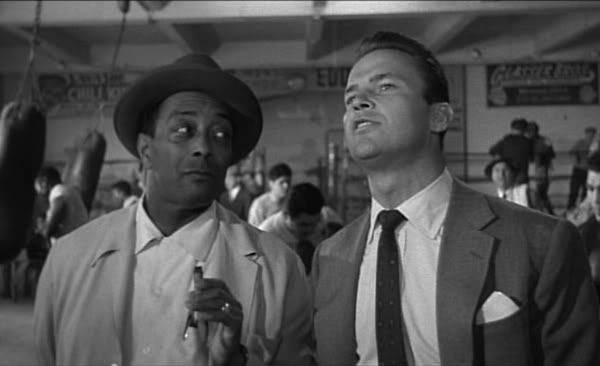
When I discovered the world of classic film, I became particularly obsessed with gangster and film noir pictures. I watched them incessantly, picking up anything with Humphrey Bogart, James Cagney or Edward G. Robinson sneering on the VHS or DVD cover. When I had run through those, I read about film noir and immediately picked up any film of note, loving every last morsel of tough dialogue and shadowy atmosphere. However, there are a few films I've missed along the way and one of the biggest, until recently, is the generally revered Kiss Me Deadly.
Based on the novel by Mickey Spillane and the fourth film by the heralded genre director Robert Aldrich, Kiss Me Deadly occupies a somewhat dated spot in film noir history. To be certain, film noir in general, with its colorful language and aesthetic boundaries dates itself, but the best films transcend those trappings to become timeless thrillers or existential exercises. Unfortunately, when the plot hinges on a particular moment in world history as Kiss Me Deadly does, the results are awkward when watching them over fifty years later.
The film definitely starts off with an effective bang. A woman comes running out of the brush near the side of a highway wearing nothing but a trench coat and screaming for someone to stop. A handsome man, with a convertible and look that says he's seen it all before, picks her up. Even though a news bulletin gives her away as a wanted woman, the man plays it cool, guiding her through a police stop and listening to her story. She is gripped by fear, worrying that someone is out to get her - and she's right. She doesn't get very far in telling her tale when the car is run off the road and she's killed. Fade to a clever reverse credit scroll.
The man in the car is private eye Mike Hammer and of course, he feels duty bound to find out who killed the mystery woman and why. Thus begins a Hammer's journey through the nameless city's seamy underbelly, as he interviews a variety of low lives to unravel this case. Naturally, the police tell him to back off as do an assorted array of baddies, but Hammer keeps his jaw squared and his eyes steely.
Behind the camera, Aldrich shows a keen eye. He keeps the viewer off balance by shooting from high up, placing the camera in corners, accenting the depth of the hallways and staircases, while throwing ominous shadows all over the place. But none of it is over the top as Aldrich maintains a steady atmosphere without it becoming a crutch. Additionally, the film benefits from some nice on location shooting around Los Angeles, adding to the heat infused tension as the film moves forward.
Unfortunately, at the midpoint of the film it is revealed that a box of nuclear material is at the center of the growing body count of brooding bad guys. What would have been a legitimate scare near the beginning of the Cold War becomes a device that throws believability right out the window. Why is the government not involved if the police are already aware of what is going on? Are we to believe that nuclear material can be stored in a box in a gym locker and is only dangerous when opened? From here the film becomes tiresome and hysterical, right up to it's finale. The 1955 theatrical release cuts about one minute from the ending, leaving things ambiguous while suggesting that every character we've come to know over the past hour and a half ends up dead. The restored ending, featured on the MGM DVD, brings back the missing sixty seconds and offers up something more conventional if just as unsatisfying.
Kiss Me Deadly is ably directed, with a strong cast and a proper assortment of eccentric locals and shifty characters. But when viewed fifty years later, it simply doesn't hold up.
Sunday, February 3, 2008
The Savages (Tamara Jenkins, 2007)
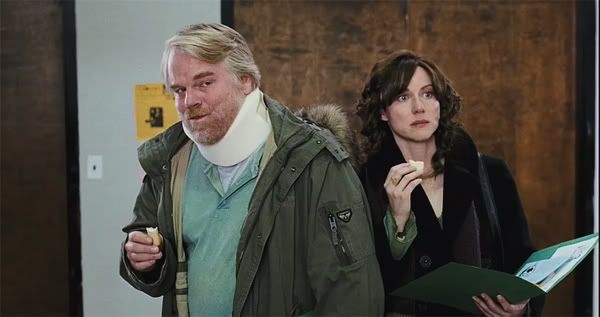
There is a key moment in the final third of Tamara Jenkins' beautifully crafted The Savages, when a student asks her theater teacher, and Bertolt Brecht devotee Jon Savage (Philip Seymour Hoffman) what the difference between plot and narrative is. It's a sly wink on behalf on Jenkins, who also wrote the screenplay, as her second full length feature quietly and confidently side steps a traditional story arc for something far more organic.
The film traces the difficult decision of siblings Jon and Wendy Savage (Laura Linney) to place their aging father, who is suffering from dementia, into a nursing home. Still dealing with the effects of a less than perfect childhood in which their mother left and their father never seemed to be present, Jon and Wendy struggle to balance their feelings of the past to deal with the present situation. While the subject matter is serious, the tone is appropriately much more complex. Jenkins' intelligent screenplay, is by turns hilarious and heartbreaking, and thankfully avoids self indulgent hand wringing, big dramatic speeches or an overwrought message, favoring illuminating moments found in the smallest of spaces.
As the film progresses, the somewhat estranged Jon and Wendy form a quiet bond as they care for their father. Both deliriously intelligent (anyone with a remote knowledge of liberal arts college courses will chuckle at many of the references peppered throughout), with a shared love of the theater, their time together also brings to the surface some harsh and at times similar realities about their personal lives. It isn't long before a tentative, unspoken alliance is made with a quiet support and respect for each other.
There are no reconciliations or easy answers here. As their father slips further away into his disease, there is hard fought acceptance and a desire by Jon and Wendy to at least try and connect with him before he's gone. Their efforts are genuine and at times touching, but always leavened by the fact that their father's time is almost up. Time passes, and a small part of each of them grows up a little more. No, they haven't quite figured out all the angles yet of their personal lives, and maybe they never will, but with a new found effort to stay connected, the Savages realize that sometimes family are the only ones who can understand you.
Labels:
Comedy,
Drama,
Laura Linney,
Philip Seymour Hoffman,
Tamara Jenkins
Tuesday, January 29, 2008
The 10 Best Films Of 2007
I know it's coming a bit late, but I had wanted to make sure I saw as many of 2007's films before finalizing my list. It was a great year for film, which made it that much tougher to whittle the list down to just ten. It could easily have been a list of fifteen or twenty solid films, but these are the ten that made it a year to remember:
1. Away From Her (Sarah Polley)
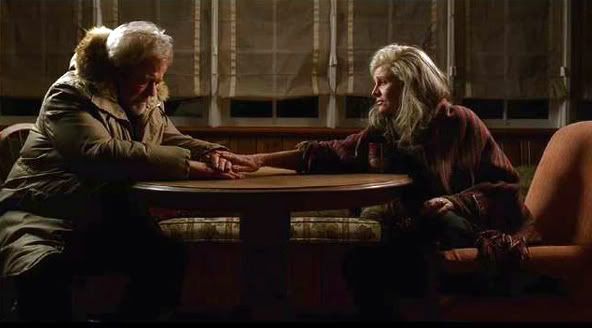
29 year old Sarah Polley's directorial debut, based on Alice Munro's short story A Bear Came Over The Mountain displayed a grace and maturity that was unequalled by any other filmmaker or film this year. Tackling the tough subject of Alzheimer's would be a difficult task for any director, but that Polley does so with such careful consideration and measured tones makes her film all the more remarkable. There are no big emotional scenes or dramatic crescendos, but simply the fallout of diagnosis marked by quiet loss, glimmers of hope and understated strength. Though much of the acclaim for the film has fallen on Julie Christie's shoulders, the entire cast is remarkable. But ultimately, the film belongs in the hands of Polley, and with this film, she marks herself as a serious artist, an undeniable talent and one of the most promising young directors to arrive in ages.
2. The Assassination Of Jesse James By The Coward Robert Ford (Andrew Dominik)
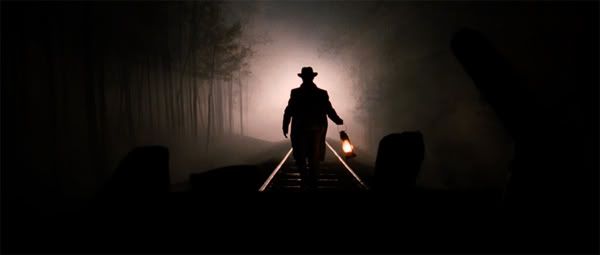
On paper, the delayed release dates and rumors of post-production battles between director Andrew Dominik and Warner Brothers spelled disaster. As Dominik struggled to bring his initial four-and-a-half-hour cut of the film down to something manageable, Warner Brothers occasionally brought in outside editors to take a crack at it. Even producer Ridley Scott and producer/star Brad Pitt had their input. Eventually, Dominik delivered his final cut, and Warner Brothers, who already had reservations about Dominik's contemplative western, ultimately dumped the film into limited markets with few press screenings or advertising. The film became a cause celebre among films fans and it's easy to see why. The Assassination Of Jesse James By The Coward Robert Ford is a visually stunning, ruminative film about the illusion of celebrity, the intangibility of myth and the allure of fame. Brad Pitt is solid in the lead as a slowly unraveling and paranoid Jesse James, but the film belongs to Casey Affleck in his breakout performance as Robert Ford. All raw nerves and wounded pride, Ford struggles to reconcile the real Jesse James with the hero he read about in dime store novels. Structured like the very serials that Ford read, and guided by an erudite voiceover narration, Dominik's film is a fascinating journey into myth and memory.
3. No Country For Old Men (Coen Brothers)
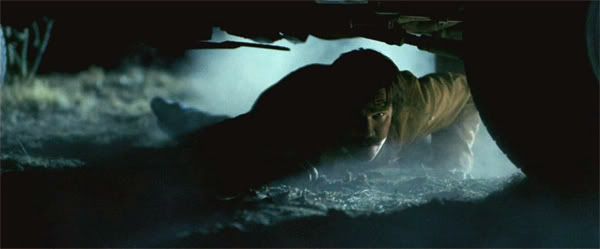
The Coen Brothers returned this year with their best film in over a decade, and perhaps one of the most accomplished films of their careers. To explain the film would take away many of the surprises, but ultimately, the film concerns three men who desperately try to outrun their individual paths. Sheriff Bell (Tommy Lee Jones), Vietnam veteran Llewelyn Moss (Josh Brolin) and relentless killer Anton Chigurgh (Javier Bardem) tempt, dodge and ultimately confront the fates their actions inevitably lead them to. The much discussed ending is perfect, adding a note of terrifying uncertainly to the Coen's ultimately grim assessment of their characters. Flawlessly constructed and heart-stoppingly suspenseful, the Coens have raised their already high bar to a whole new standard.
4. Zodiac (David Fincher)

For his sixth film, David Fincher returned to the serial killer genre that made his name famous when he directed Se7en. However, where that film explored the dark motivations of the fictional killer at its core, Fincher’s masterful Zodiac terrifies in completely different ways. Based on the true story of the Zodiac killer that cast a haunting shadow over the San Francisco area during the late '60s and early '70s, it is the seemingly random nature of the slayings and its victims that chills most of all. Fincher's film is less concerned with the methods and mind of the killer, than with the gruelling task of the policemen and press who desperately tried to overcome bureaucratic red tape, mountains of false leads and limited resources to capture him. What begins as a standard genre tale patiently evolves into a film about obsession. As the killer remains unidentified and years begin to pass, it's the lone work of Robert Graysmith, a former political cartoonist that keeps the case alive. His home becomes a library of boxes filled with notes and files, while his marriage eventually succumbs to his unrelenting quest for an answer. This obsessive nature carries over behind the camera as well, as Fincher, from the opening frame using the oldschool Paramount logo, to the meticulous set design, to the gorgeously rendered CGI backdrops doesn't miss a single detail in reconstructing 1970s San Francisco. And as the film spans several decades, Fincher employs some clever tricks to mark the passage of time, from the fast frame of a skyscraper going up to the now famous blackout sequence (available on the director's cut DVD) which uses an audio montage of pop hits and news sound bytes to mark the transition from the '70s to the '80s. Fincher's control behind the camera and in the editing room has never been stronger. In a film that gives the audience a dearth of information including multiple suspects, locations and clues, Fincher conveys every fascinating morsel clearly. And we can't help but to be become as obsessed as the filmmaker and his characters as they desperately try to close the case.
5. There Will Be Blood (Paul Thomas Anderson)
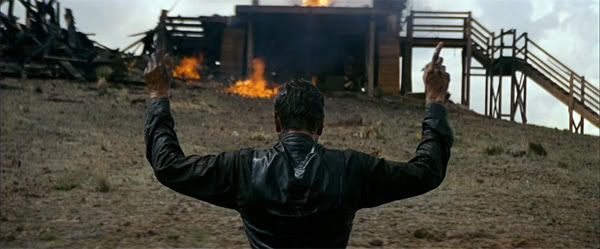
Paul Thomas Anderson has never been short on ambition. Whether it has been Magnolia, his sprawling tale about lost souls in Los Angeles; Boogie Nights, the seemingly unfilmable story about the rise and fall of a young porn star or Punch Drunk Love, a slightly skewed fairy tale romance involving pudding, a harmonium and Adam Sandler, Anderson has proven himself to be up to the challenge. However, when a teaser for There Will Be Blood appeared online last summer, no one could have predicted how much of a left turn Anderson had decided to take. Moving away from his safe cast of regulars, and even his usual scoring collaborator Jon Brion, There Will Be Blood is Anderson's bravest, boldest departure yet. Based loosely on Upton Sinclair's Oil!, the film is equal parts Treasure Of The Sierra Madre , Citizen Kane and The Shining that all combine into something that defiantly avoids categorization. Everything from the brilliant, nearly silent opening twenty minutes, to Jonny Greenwood's sparse, avant garde score to Daniel Day Lewis' already legendary portrayal of ruthless oil prospector Daniel Plainview defies convention. While the Great American Novel has yet to be written, Paul Thomas Anderson, with unparalleled verve, audacity and control of his craft comes astonishingly close to creating the Great American Film. Greed, religion, blood, oil and ambition: Anderson covers his thematic territory fearlessly and his ability to indentify with the last quality is what makes this film one of the most audacious filmmaker statements to hit screens all year - or any year.
6. Michael Clayton (Tony Gilroy)
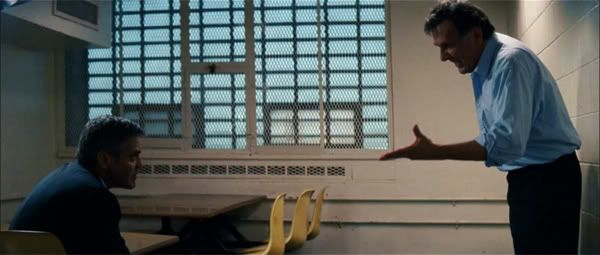
Denouncing corporations like Starbucks, McDonald's or WalMart seems to be almost a reflex these days. Most people would tend to agree some the corporate business practices of these companies and their ethics leave much to be desired, but it's hardly a revolutionary stance. The question put forth by screenwriter Tony Gilroy in his directorial debut Michael Clayton is: "What if you're part of the machine?" While the plot revolves around a legal case involving the shady dealings of a Monsanto-like corporation, it is ultimately about the ethical choices we make in trying to put food on the table, keep the lights on and take care of the ones we love. What if the company we work for creates a product that might harm people? What if our position at a company indirectly makes someone's life difficult? What are we willing to live with and what are we willing to sacrifice? These are the kind of questions that Gilroy's intelligent script quietly draws out. As the film progresses, the lines of personal ethics are drawn and redrawn, as lives become shattered and people seek redemption. A smart, engaging film, Gilroy's first effort is a welcome throwback to the lean, muscled genre pictures of the '70s twisted with a touch of a modern day politics.
7. Sunshine (Danny Boyle)

Director Danny Boyle has never been one to stick to a specific style or genre. From the drug fuelled shenanigans of Trainspotting, to the redefined zombies of 28 Days Later... to the family fantasy of Millions, Boyle has enthusiastically thrown himself full throttle into new challenges with each picture. When Boyle's next film was announced to be a sci-fi epic about a mission to reignite a dying Sun, the shift in stylistic gears was hardly surprising. If that was somewhat expected, then the depth of Alex Garland's script was the real treat. What begins as a 2001: A Space Odyssey styled meditation on man and the universe, quickly mixes elements of Agatha Christie's Ten Little Indians and religious faith to create a film that is a surprisingly moving ode to our place in the galaxy. That Boyle manages to get these ideas across in the construct of a thriller is all the more powerful. Sunshine pays tribute to the classic science fiction films that came before while deservedly carving out its own place alongside those works. So what's Boyle up to now? He's in India filming a comedy about an illiterate child who wants to become a contestant on the Hindi version of Who Wants To Be A Millionaire? Once again, Boyle is going where the challenges are, and as long as he keeps doing that, audiences are in for years of unique, new films from an under-appreciated director.
8. Into The Wild (Sean Penn)
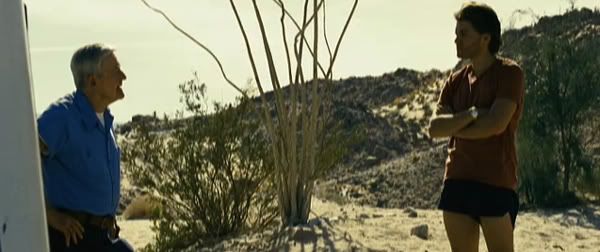
The premise of the film sounds like a college activist cliche. A university graduate gives away his savings, gets rid of his possessions, burns up his social insurance card and decides to live off the grid and discover America. Add vocal activist Sean Penn to the mix and you have the recipe for a strident polemic against contemporary America. But that's not what happens. Based on a true story, Penn's film is less concerned with the politics behind Christopher McCandless' decision than with the journey. Penn's direction works because it never devolves into simpleminded judgments or pat summaries of the characters. What emerges is a complex story of failed parenting, mule-headed youth, idealistic dreams all while paying tribute to an America that is slowly disappearing to strip malls and box stores. The film plays out like a long form version of the closing, moving sequence in Spike Lee's 25th Hour in which the father of a convicted felon considers for one moment, helping his son escape his fate by driving him across America, showing him the wonders of such a huge country that he has yet to experience. In many ways, Penn's film shares Lee's heart. As we follow McCandless across America to his final destination - Alaska - Penn's on location shooting beautifully captures the oddities, wonders and beauty of some of the most unique sites on this continent. While Penn can come across as simplistic and abrasive with his politics off camera, behind it, he displays a great composure and a genuine admiration for the richness of the people and places that span the land between the oceans. And if McCandless' ultimately heartbreaking journey was worth anything, it was for those moments when he found a place for himself in a world that all too often moves too quickly.
9. The Bourne Ultimatum (Paul Greengrass)

Bold themes? Nope. Groundbreaking narrative technique? Nope. A moving, touching story about a struggle to overcome a personal obstacle? Hell no. So what makes The Bourne Ultimatum one of the year's best films? Nothing but a nearly flawless execution of directorial control and editing acumen. In a cinematic world where studios foist upon audiences unnecessary and ridiculous sequels to Die Hard and Rambo, the Bourne series continues to be a breath of fresh air, pumping new, vibrant blood into the action and spy genres. The third installment, which finds Jason Bourne on a quest to find out why and who made him into a ruthless assassin, is easily the best of the lot. Lean and efficient there isn't a moment wasted here, as we follow Bourne from England to Spain to Morocco and finally the United States as he tries to find answers. Greengrass ups the pulse, by shooting many of the fight sequences with handheld digital cameras requiring editing so crisp and quick it would make MTV cry. Intentionally breathless and relentless paced the Bourne Ultimatum is a thriller for the digital era with the sensibilities of classic spy films gone by.
10. 3:10 To Yuma (James Mangold)
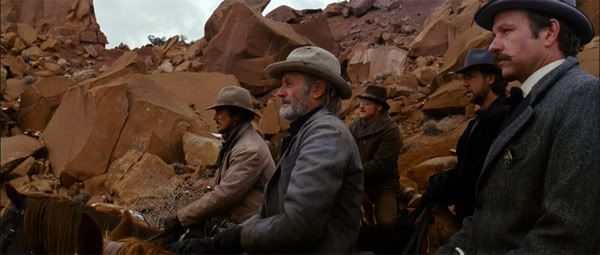
Like an American twin of Danny Boyle, James Mangold has also been a difficult director to pin down. His debut feature, Heavy was an elliptical, gorgeous and criminally underappreciated tale of unrequited love and suppressed ambition. From there he went on to man such diverse films as Cop Land, Girl, Interrupted and Identity before hitting Academy gold with the Johnny Cash biopic Walk The Line. 3:10 To Yuma, a remake of the minor 1957 Delmer Daves classic, is about the wily cat and mouse game between outlaw Ben Wade and his prison escort, rancher Dan Evans. Mangold wisely doesn't stray much from the original, and allows his two leads - Russell Crowe and Christian Bale - to flesh out the characters more fully, while darkening the edges around the film to play better for a modern audience. While films like Unforgiven and the aforementioned Assassination Of Jesse James By The Coward Robert Ford aspire to greater thematic goals, Mangold's film is unique in being one of the rare westerns in recent memory that wants nothing more to be an entertaining popcorn chomper. On that note, the film succeeds brilliantly, building effectively to its memorable final showdown.
1. Away From Her (Sarah Polley)

29 year old Sarah Polley's directorial debut, based on Alice Munro's short story A Bear Came Over The Mountain displayed a grace and maturity that was unequalled by any other filmmaker or film this year. Tackling the tough subject of Alzheimer's would be a difficult task for any director, but that Polley does so with such careful consideration and measured tones makes her film all the more remarkable. There are no big emotional scenes or dramatic crescendos, but simply the fallout of diagnosis marked by quiet loss, glimmers of hope and understated strength. Though much of the acclaim for the film has fallen on Julie Christie's shoulders, the entire cast is remarkable. But ultimately, the film belongs in the hands of Polley, and with this film, she marks herself as a serious artist, an undeniable talent and one of the most promising young directors to arrive in ages.
2. The Assassination Of Jesse James By The Coward Robert Ford (Andrew Dominik)

On paper, the delayed release dates and rumors of post-production battles between director Andrew Dominik and Warner Brothers spelled disaster. As Dominik struggled to bring his initial four-and-a-half-hour cut of the film down to something manageable, Warner Brothers occasionally brought in outside editors to take a crack at it. Even producer Ridley Scott and producer/star Brad Pitt had their input. Eventually, Dominik delivered his final cut, and Warner Brothers, who already had reservations about Dominik's contemplative western, ultimately dumped the film into limited markets with few press screenings or advertising. The film became a cause celebre among films fans and it's easy to see why. The Assassination Of Jesse James By The Coward Robert Ford is a visually stunning, ruminative film about the illusion of celebrity, the intangibility of myth and the allure of fame. Brad Pitt is solid in the lead as a slowly unraveling and paranoid Jesse James, but the film belongs to Casey Affleck in his breakout performance as Robert Ford. All raw nerves and wounded pride, Ford struggles to reconcile the real Jesse James with the hero he read about in dime store novels. Structured like the very serials that Ford read, and guided by an erudite voiceover narration, Dominik's film is a fascinating journey into myth and memory.
3. No Country For Old Men (Coen Brothers)

The Coen Brothers returned this year with their best film in over a decade, and perhaps one of the most accomplished films of their careers. To explain the film would take away many of the surprises, but ultimately, the film concerns three men who desperately try to outrun their individual paths. Sheriff Bell (Tommy Lee Jones), Vietnam veteran Llewelyn Moss (Josh Brolin) and relentless killer Anton Chigurgh (Javier Bardem) tempt, dodge and ultimately confront the fates their actions inevitably lead them to. The much discussed ending is perfect, adding a note of terrifying uncertainly to the Coen's ultimately grim assessment of their characters. Flawlessly constructed and heart-stoppingly suspenseful, the Coens have raised their already high bar to a whole new standard.
4. Zodiac (David Fincher)

For his sixth film, David Fincher returned to the serial killer genre that made his name famous when he directed Se7en. However, where that film explored the dark motivations of the fictional killer at its core, Fincher’s masterful Zodiac terrifies in completely different ways. Based on the true story of the Zodiac killer that cast a haunting shadow over the San Francisco area during the late '60s and early '70s, it is the seemingly random nature of the slayings and its victims that chills most of all. Fincher's film is less concerned with the methods and mind of the killer, than with the gruelling task of the policemen and press who desperately tried to overcome bureaucratic red tape, mountains of false leads and limited resources to capture him. What begins as a standard genre tale patiently evolves into a film about obsession. As the killer remains unidentified and years begin to pass, it's the lone work of Robert Graysmith, a former political cartoonist that keeps the case alive. His home becomes a library of boxes filled with notes and files, while his marriage eventually succumbs to his unrelenting quest for an answer. This obsessive nature carries over behind the camera as well, as Fincher, from the opening frame using the oldschool Paramount logo, to the meticulous set design, to the gorgeously rendered CGI backdrops doesn't miss a single detail in reconstructing 1970s San Francisco. And as the film spans several decades, Fincher employs some clever tricks to mark the passage of time, from the fast frame of a skyscraper going up to the now famous blackout sequence (available on the director's cut DVD) which uses an audio montage of pop hits and news sound bytes to mark the transition from the '70s to the '80s. Fincher's control behind the camera and in the editing room has never been stronger. In a film that gives the audience a dearth of information including multiple suspects, locations and clues, Fincher conveys every fascinating morsel clearly. And we can't help but to be become as obsessed as the filmmaker and his characters as they desperately try to close the case.
5. There Will Be Blood (Paul Thomas Anderson)

Paul Thomas Anderson has never been short on ambition. Whether it has been Magnolia, his sprawling tale about lost souls in Los Angeles; Boogie Nights, the seemingly unfilmable story about the rise and fall of a young porn star or Punch Drunk Love, a slightly skewed fairy tale romance involving pudding, a harmonium and Adam Sandler, Anderson has proven himself to be up to the challenge. However, when a teaser for There Will Be Blood appeared online last summer, no one could have predicted how much of a left turn Anderson had decided to take. Moving away from his safe cast of regulars, and even his usual scoring collaborator Jon Brion, There Will Be Blood is Anderson's bravest, boldest departure yet. Based loosely on Upton Sinclair's Oil!, the film is equal parts Treasure Of The Sierra Madre , Citizen Kane and The Shining that all combine into something that defiantly avoids categorization. Everything from the brilliant, nearly silent opening twenty minutes, to Jonny Greenwood's sparse, avant garde score to Daniel Day Lewis' already legendary portrayal of ruthless oil prospector Daniel Plainview defies convention. While the Great American Novel has yet to be written, Paul Thomas Anderson, with unparalleled verve, audacity and control of his craft comes astonishingly close to creating the Great American Film. Greed, religion, blood, oil and ambition: Anderson covers his thematic territory fearlessly and his ability to indentify with the last quality is what makes this film one of the most audacious filmmaker statements to hit screens all year - or any year.
6. Michael Clayton (Tony Gilroy)

Denouncing corporations like Starbucks, McDonald's or WalMart seems to be almost a reflex these days. Most people would tend to agree some the corporate business practices of these companies and their ethics leave much to be desired, but it's hardly a revolutionary stance. The question put forth by screenwriter Tony Gilroy in his directorial debut Michael Clayton is: "What if you're part of the machine?" While the plot revolves around a legal case involving the shady dealings of a Monsanto-like corporation, it is ultimately about the ethical choices we make in trying to put food on the table, keep the lights on and take care of the ones we love. What if the company we work for creates a product that might harm people? What if our position at a company indirectly makes someone's life difficult? What are we willing to live with and what are we willing to sacrifice? These are the kind of questions that Gilroy's intelligent script quietly draws out. As the film progresses, the lines of personal ethics are drawn and redrawn, as lives become shattered and people seek redemption. A smart, engaging film, Gilroy's first effort is a welcome throwback to the lean, muscled genre pictures of the '70s twisted with a touch of a modern day politics.
7. Sunshine (Danny Boyle)

Director Danny Boyle has never been one to stick to a specific style or genre. From the drug fuelled shenanigans of Trainspotting, to the redefined zombies of 28 Days Later... to the family fantasy of Millions, Boyle has enthusiastically thrown himself full throttle into new challenges with each picture. When Boyle's next film was announced to be a sci-fi epic about a mission to reignite a dying Sun, the shift in stylistic gears was hardly surprising. If that was somewhat expected, then the depth of Alex Garland's script was the real treat. What begins as a 2001: A Space Odyssey styled meditation on man and the universe, quickly mixes elements of Agatha Christie's Ten Little Indians and religious faith to create a film that is a surprisingly moving ode to our place in the galaxy. That Boyle manages to get these ideas across in the construct of a thriller is all the more powerful. Sunshine pays tribute to the classic science fiction films that came before while deservedly carving out its own place alongside those works. So what's Boyle up to now? He's in India filming a comedy about an illiterate child who wants to become a contestant on the Hindi version of Who Wants To Be A Millionaire? Once again, Boyle is going where the challenges are, and as long as he keeps doing that, audiences are in for years of unique, new films from an under-appreciated director.
8. Into The Wild (Sean Penn)

The premise of the film sounds like a college activist cliche. A university graduate gives away his savings, gets rid of his possessions, burns up his social insurance card and decides to live off the grid and discover America. Add vocal activist Sean Penn to the mix and you have the recipe for a strident polemic against contemporary America. But that's not what happens. Based on a true story, Penn's film is less concerned with the politics behind Christopher McCandless' decision than with the journey. Penn's direction works because it never devolves into simpleminded judgments or pat summaries of the characters. What emerges is a complex story of failed parenting, mule-headed youth, idealistic dreams all while paying tribute to an America that is slowly disappearing to strip malls and box stores. The film plays out like a long form version of the closing, moving sequence in Spike Lee's 25th Hour in which the father of a convicted felon considers for one moment, helping his son escape his fate by driving him across America, showing him the wonders of such a huge country that he has yet to experience. In many ways, Penn's film shares Lee's heart. As we follow McCandless across America to his final destination - Alaska - Penn's on location shooting beautifully captures the oddities, wonders and beauty of some of the most unique sites on this continent. While Penn can come across as simplistic and abrasive with his politics off camera, behind it, he displays a great composure and a genuine admiration for the richness of the people and places that span the land between the oceans. And if McCandless' ultimately heartbreaking journey was worth anything, it was for those moments when he found a place for himself in a world that all too often moves too quickly.
9. The Bourne Ultimatum (Paul Greengrass)

Bold themes? Nope. Groundbreaking narrative technique? Nope. A moving, touching story about a struggle to overcome a personal obstacle? Hell no. So what makes The Bourne Ultimatum one of the year's best films? Nothing but a nearly flawless execution of directorial control and editing acumen. In a cinematic world where studios foist upon audiences unnecessary and ridiculous sequels to Die Hard and Rambo, the Bourne series continues to be a breath of fresh air, pumping new, vibrant blood into the action and spy genres. The third installment, which finds Jason Bourne on a quest to find out why and who made him into a ruthless assassin, is easily the best of the lot. Lean and efficient there isn't a moment wasted here, as we follow Bourne from England to Spain to Morocco and finally the United States as he tries to find answers. Greengrass ups the pulse, by shooting many of the fight sequences with handheld digital cameras requiring editing so crisp and quick it would make MTV cry. Intentionally breathless and relentless paced the Bourne Ultimatum is a thriller for the digital era with the sensibilities of classic spy films gone by.
10. 3:10 To Yuma (James Mangold)

Like an American twin of Danny Boyle, James Mangold has also been a difficult director to pin down. His debut feature, Heavy was an elliptical, gorgeous and criminally underappreciated tale of unrequited love and suppressed ambition. From there he went on to man such diverse films as Cop Land, Girl, Interrupted and Identity before hitting Academy gold with the Johnny Cash biopic Walk The Line. 3:10 To Yuma, a remake of the minor 1957 Delmer Daves classic, is about the wily cat and mouse game between outlaw Ben Wade and his prison escort, rancher Dan Evans. Mangold wisely doesn't stray much from the original, and allows his two leads - Russell Crowe and Christian Bale - to flesh out the characters more fully, while darkening the edges around the film to play better for a modern audience. While films like Unforgiven and the aforementioned Assassination Of Jesse James By The Coward Robert Ford aspire to greater thematic goals, Mangold's film is unique in being one of the rare westerns in recent memory that wants nothing more to be an entertaining popcorn chomper. On that note, the film succeeds brilliantly, building effectively to its memorable final showdown.
Friday, January 18, 2008
Juno (Jason Reitman, 2007)
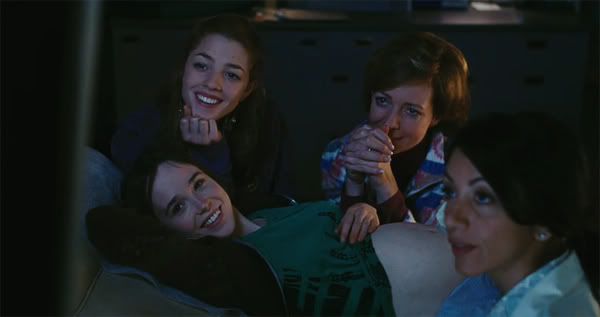
As Juno continues to build box office earnings, buzz and undoubtedly works toward a couple of Oscar nominations, the talk of the internet has been of first time screenwriter Diablo Cody, and film's quirky dialogue. As many reviews, both positive and negative, have pointed out Cody's dialogue is, depending on the writer's point of view, either unique and eccentric or annoying and unrealistic. Roger Ebert has weighed in on the debate stating in his Answer Man column, "Movie characters don't talk like real people. If they did, they'd drive us nuts."
To take Ebert's point further, movie characters have almost never talked "realistically". From the tough talking mugs of classic gangster films, to the speed talking antics of screwball comedies and even to the level headed dialogue of political and police procedurals and dramas, dialogue is always stylized to both entertain and forward the plot. Even films or television shows which are praised for their "realism" are still stylized to a certain degree, highlighting linguistic elements to heighten comedic or dramatic effect. In the case of Juno, I saw neither brilliance nor contrivance. What Cody has done, admirably, is capture the rapid fire wit of a too smart teen within the milieu of her friends. I found it no different than the tangents my friends and I can run into which weave music references, inside jokes and off-color puns. Anyone who might overhear us might just have the same reaction they did upon the opening minutes of the film. And it is a reaction that I too had upon the first fifteen or so minutes of the film. But as the film progressed I fell into the rhythms of the dialogue and walking out of Juno I knew the next time I saw the film the dialogue wouldn't be an issue.
Oh yeah, but is the film good?
In short, yes. If the first two-thirds of the film are enjoyable, if somewhat familiar, Diablo Cody earns the various kudos she has received with the final act of her film. As the plot - which follows the path of a pregnant teenager who decides to give the child to a couple who can't conceive - rolls along with genuine laughs, it's the growth of Juno (played with alarming authenticity by Ellen Page) and the surprising depth Jason Bateman and Jennifer Garner bring to their roles of the expecting, desperate parents that elevates the film. Cody takes makes some interesting, original choices with her characters in the final portions of the film that turns Juno from a comedy about pregnancy, into a film about parenting and how as we grow up, we don't get smarter, we just gain more experience. It's up to us to use that experience, to make smart choices. And if the dialogue isn't realistic, the heart of the film is, and that is what makes it a joy to watch.
Sunday, January 6, 2008
American Gangster (Ridley Scott, 2007)
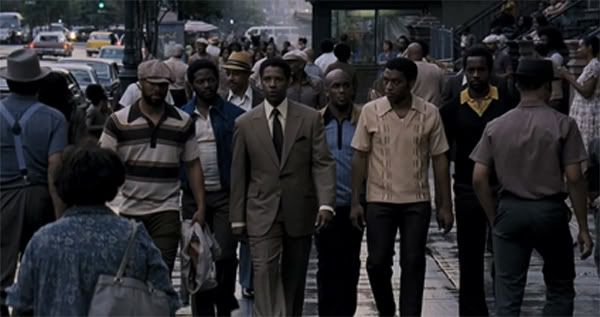
American Gangster bursts onto the screen with ambition, an all star cast and a familiar story of scrappy mob underling making his name in the underworld. The twist this time around is that the setting is Harlem, and we get to see a rare glimpse into the workings of the African-American underworld. Based on the true story of Harlem kingpin Frank Lucas, who rose to prominence by importing and distributing heroin directly from Asia and cutting out the middleman, director Ridley Scott unfortunately can't overcome the film's structural cliches. First established by the classic Warner Brothers gangster films like The Public Enemy and Little Caesar, refined by the Godfather films, oversized by Brian DePalma's Scarface and pretty much perfected by Martin Scorsese's GoodFellas, American Gangster by comparison is disappointingly familiar and does nothing to separate itself from the aforementioned pack.
To be certain, the cast is certainly up to the task. The always reliable Denzel Washington, is strong here as Lucas and Russell Crowe wonderfully shapes his role as Richie Roberts, the cop who aims to bring him down. In a role that would otherwise be lost under the far more fascinating of character of Lucas, Crowe's shabby, hangdog interpretation of Roberts' swings our sympathies his way. The supporting cast, particularly the constantly underrated Chiwetel Ejiofor (who was also unsung alongside Washington in Spike Lee's excellent Inside Man) are also strong, if underutilized.
The main problem is Steve Zaillian's script. Oddly unfocused, the plot threads involving Roberts' domestic situation and Lucas' cousin's ambition to play professional baseball feel either tacked on or extraneous at best. On the flipside, Lucas' wife is underwritten, only reacting to the more serious plot turns when she has to, but otherwise disappearing into the background the rest of the time. Their relationship merely serves to move plot points ahead and little more. And even though the forthcoming DVD release promises an extra 20 minutes, on top of the already lengthy 158 minute running time, I can't imagine these problems will be solved. Furthermore, even portions of the main story - particularly those that hint at racism inside the Drug Enforcement Agency and overall power struggle for the drug trade in New York City, are mere blips in a story that moves forward in a merely steady, workmanlike fashion.
If there is any reason to recommend this film, it is for the final twenty minutes. When Washington and Crowe finally share screen time, the result is electric. The film suddenly has more life that it did at any point up until then. And without spoiling anything, the closing intertitles that explain what happened to both Lucas and Roberts points at a far more fascinating film that certainly would've offered a new window in which to view the criminal underworld.
Labels:
Denzel Washington,
gangster,
Ridley Scott,
Russell Crowe
Subscribe to:
Comments (Atom)


